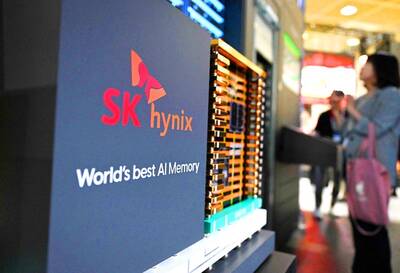Taiwan Semiconductor Manufacturing Co (TSMC, 台積電), the world’s largest contract chipmaker, was the top patent applicant in Taiwan for the fourth consecutive year last year, the Ministry of Economic Affairs said on Friday.
TSMC was the top patent applicant in the local and foreign business communities in Taiwan, while Alibaba Group Services Ltd from China’s largest e-commerce operator, Alibaba Group Holding Ltd (阿里巴巴), was No. 1 for patent applications among foreign firms last year, the ministry said.
TSMC filed 1,333 patent applications, up 41 percent from a year earlier. The company’s applications breached 1,000 for the first time last year, which was its fifth consecutive year of growth, ministry data showed.
All of TSMC’s applications were for invention patents, the ministry said.
The Patent Act (專利法) defines three groups — invention, utility model and design patents — with inventions the most important in terms of the creation of technical ideas.
TSMC has been gearing up to compete with South Korea’s Samsung Electronics Co in sophisticated 3-nanometer technology development by boosting its capital expenditure, so its patent applications increased accordingly, Intellectual Property Office Director-General Hong Shu-min (洪淑敏) said.
The 7nm process is the latest technology on which TSMC has started mass production. It has said it is planning to launch mass production of a 5 nanometer process this year and a 3 nanometer process in 2022.
TSMC’s capital expenditure this year is expected to reach a new high of US$15 billion to US$16 billion, the firm said last month.
The increase in capital spending could boost the number of patent applications it submits this year, analysts said.
Acer Inc (宏碁) was second for local patent applications, filing 565 applications, comprised of 407 invention patents, 108 utility model patents and 50 design patents.
Flat-panel maker AU Optronics Corp (友達光電) had 553 applications, the Industrial Technology Research Institute (工研院) had 385 and integrated circuit designer MediaTek Inc (聯發科) had 356, ministry data showed.
Among the top foreign applicants, Alibaba filed 850 patent applications last year, comprised of 828 invention patents, three utility model patents and 19 design patents, the data showed.
US-based semiconductor production equipment supplier Applied Materials Inc was second with 663 patent applications, followed by US-based IC designer Qualcomm Inc with 582, Japan-based semiconductor supplier Tokyo Electron Ltd with 496 and electrical products maker Nitto Denko Corp with 403.
The number of applications by Qualcomm fell 42 percent from a year earlier due to a relatively high comparison base in 2018, when it filed more than 1,000 applications, Hong said.
Last year, the office received 74,652 applications, up 2 percent from a year earlier, with invention applications making up 80 percent, the data showed.
Invention patent applications rose 8 percent from a year earlier, third consecutive year of increases, while design patent applications rose 10 percent, the office said.
Design patent applications fell slightly last year, the office added.

Quanta Computer Inc (廣達) chairman Barry Lam (林百里) is expected to share his views about the artificial intelligence (AI) industry’s prospects during his speech at the company’s 37th anniversary ceremony, as AI servers have become a new growth engine for the equipment manufacturing service provider. Lam’s speech is much anticipated, as Quanta has risen as one of the world’s major AI server suppliers. The company reported a 30 percent year-on-year growth in consolidated revenue to NT$1.41 trillion (US$43.35 billion) last year, thanks to fast-growing demand for servers, especially those with AI capabilities. The company told investors in November last year that

United Microelectronics Corp (UMC, 聯電) forecast that its wafer shipments this quarter would grow up to 7 percent sequentially and the factory utilization rate would rise to 75 percent, indicating that customers did not alter their ordering behavior due to the US President Donald Trump’s capricious US tariff policies. However, the uncertainty about US tariffs has weighed on the chipmaker’s business visibility for the second half of this year, UMC chief financial officer Liu Chi-tung (劉啟東) said at an online earnings conference yesterday. “Although the escalating trade tensions and global tariff policies have increased uncertainty in the semiconductor industry, we have not

Power supply and electronic components maker Delta Electronics Inc (台達電) yesterday said it plans to ship its new 1 megawatt charging systems for electric trucks and buses in the first half of next year at the earliest. The new charging piles, which deliver up to 1 megawatt of charging power, are designed for heavy-duty electric vehicles, and support a maximum current of 1,500 amperes and output of 1,250 volts, Delta said in a news release. “If everything goes smoothly, we could begin shipping those new charging systems as early as in the first half of next year,” a company official said. The new

SK Hynix Inc warned of increased volatility in the second half of this year despite resilient demand for artificial intelligence (AI) memory chips from big tech providers, reflecting the uncertainty surrounding US tariffs. The company reported a better-than-projected 158 percent jump in March-quarter operating income, propelled in part by stockpiling ahead of US President Donald Trump’s tariffs. SK Hynix stuck with a forecast for a doubling in demand for the high-bandwidth memory (HBM) essential to Nvidia Corp’s AI accelerators, which in turn drive giant data centers built by the likes of Microsoft Corp and Amazon.com Inc. That SK Hynix is maintaining its